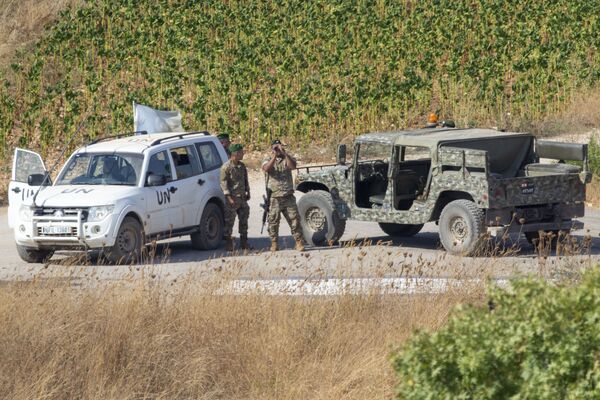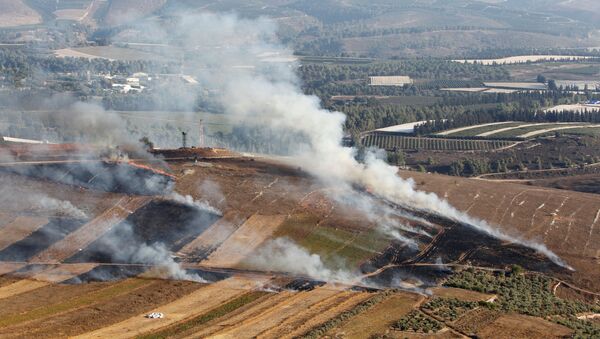On 1 September, the Israeli Defence Forces (IDF) and Hezbollah clashed along the Israel-Lebanon border. Following the Lebanese militant group's missile attack on IDF outposts, the Israeli military returned fire by sending around 100 artillery shells into southern Lebanon and conducting an air strike.
On Monday, Hezbollah's leader Sayyed Hassan Nasrallah said in a televised statement that the standoff between the Lebanese militant group and Israel had entered a “new phase”. In response, Israeli Prime Minister Benjamin Netanyahu dubbed Nasrallah "the man in the bunker in Beirut" and praised the IDF's reprisal operation, adding that Israeli forces had sustained no casualties.
"Hezbollah has demonstrated its ability to conduct military operations despite numerous security measures taken by the Israeli Army", says Salem Zahran, a political scientist and head of the Lebanese Information Centre. "Israel is at a loss. Its army couldn't detect the Hezbollah fighters who conducted the operation".
For his part, Rafaat al Badawi, a Lebanese regional policy expert, noted that the recent Hezbollah strike sent a personal message to Israeli Prime Minister Netanyahu "that it is necessary to adhere to international standards of warfare, which the latter repeatedly violated".
The Sunday exchange of fire followed an alleged Israeli drone attack on 25 August targeting a Hezbollah stronghold south of Beirut. According to the militant group's broadcaster Al-Manar, Israel launched two drones from vessels off the Lebanese coast. One of the drones reportedly hit Hezbollah positions, while the second one crashed nearby.
"Israel does not need war", al Badawi notes, downplaying the possibility of further escalation. "We are talking about nothing more but a simple strike and the protection of the territory. A tooth for a tooth and an eye for an eye is a new equation of the regional policy. Wherever a strike is made, on land, sea or air, a symmetrical response will immediately follow".

Neither Israel nor Hezbollah are Interested in Further Escalation
According to Yakov Kedmi, a former head of Nativ, the government agency for promoting immigration from the former Soviet Union, an escalation of hostilities between Hezbollah and the IDF is hardly possible.
“The situation is quite typical for the settlement area", Kedmi explains. "What is happening today is an ordinary semi-diplomatic game, an 'exchange of courtesies'. Each side is demonstrating to its people that no one will be allowed to attack their territory with impunity. We are also bracing for the legislative elections [in Israel] soon".
The Israeli snap elections are due to take place on 17 September 2019 to elect the 120 members of the country's 22nd Knesset.
The former Nativ head notes that the Sunday cross-border incident has become the first one of that kind since the end the 2006 Lebanon War.
"Of course, everything is possible in the Middle East", suggests Kedmi. "But neither side is interested in starting a 'hot' war. It is unlikely that this 'exchange of courtesies' will last more than three days".
On Sunday, Lebanese Hezbollah fighters struck an Israeli Wolf armoured personnel carrier with an anti-tank missile near the IDF barracks in the region of the Jewish settlement of Afifim.
According to Hezbollah, eight Israeli troops were injured as a result of the missile attack. In response, Israeli artillery shelled the militant group's positions in southern Lebanon for nearly two hours. By the end of the day, the IDF announced a cessation of hostilities and allowed residents of Jewish settlements in northern Galilee to leave bomb shelters. The temporary ban has so far been reserved only for agricultural work in the immediate vicinity of the Israeli-Lebanese border.
Israel and Lebanon have fought four wars since 1947. The latest conflict erupted in summer 2006 following the Hezbollah-initiated cross border raid against Israeli military positions, dubbed by the group "Operation Truthful Promise". Israel responded with massive airstrikes as well as an air and naval blockade, and subsequent invasion of southern Lebanon. On 14 August 2006, the warring parties established a UN-brokered ceasefire. The Israeli blockade was lifted on 8 September 2006.
The views and opinions expressed by the speakers do not necessarily reflect those of Sputnik.


